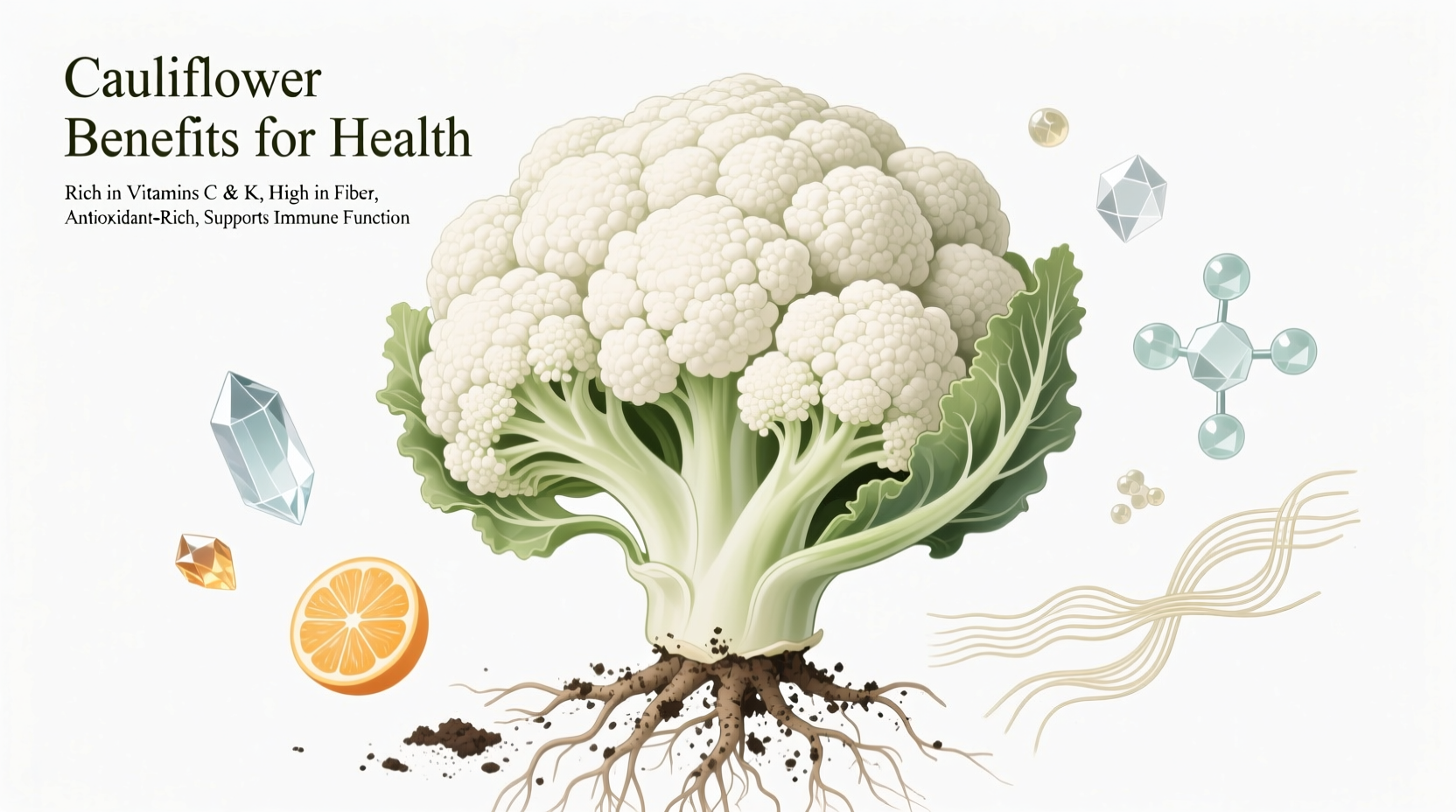Once considered merely a bland side dish, cauliflower has emerged as a nutritional powerhouse backed by scientific research. This versatile cruciferous vegetable offers remarkable health advantages that extend far beyond its mild flavor and culinary flexibility. Understanding cauliflower's specific benefits can help you make informed dietary choices that support long-term wellness.
Why Cauliflower Deserves a Place in Your Diet
Modern nutritional science reveals cauliflower contains unique phytochemicals not found in many other vegetables. Unlike its more popular cousin broccoli, cauliflower provides similar health benefits with a milder flavor profile that appeals to diverse palates. The vegetable's white appearance might suggest limited nutritional value, but this couldn't be further from the truth.

Nutritional Powerhouse: What Makes Cauliflower Special
Cauliflower's nutritional profile punches well above its weight class. A single cup (100g) of raw cauliflower delivers impressive amounts of essential nutrients while remaining low in calories. The vegetable's composition includes water-soluble vitamins, fat-soluble compounds, and unique phytochemicals that work together to support multiple body systems.
| Nutrient | Cauliflower (per 100g) | Broccoli (per 100g) | Daily Value % |
|---|---|---|---|
| Vitamin C | 48.2 mg | 89.2 mg | 54% |
| Vitamin K | 15.5 μg | 101.6 μg | 13% |
| Folate | 57 μg | 63 μg | 14% |
| Dietary Fiber | 2 g | 2.6 g | 7% |
| Choline | 44.3 mg | 20.7 mg | 8% |
Source: USDA FoodData Central (2023)
Science-Backed Health Benefits of Regular Cauliflower Consumption
Cancer Prevention Properties
Cauliflower contains glucosinolates that convert to isothiocyanates during chewing and digestion. These compounds, particularly sulforaphane, demonstrate significant anti-cancer activity in multiple research studies. According to the National Cancer Institute, cruciferous vegetables like cauliflower may help protect against various cancers including lung, colorectal, and prostate cancers through multiple biological mechanisms.
Researchers at Harvard Medical School found that regular consumption of cruciferous vegetables correlates with a 15-20% reduced risk of certain cancers. The vegetable's ability to support the body's natural detoxification pathways contributes significantly to this protective effect.
Cardiovascular Health Support
The fiber, potassium, and antioxidant content in cauliflower work synergistically to support heart health. A comprehensive review published in the American Journal of Clinical Nutrition demonstrated that increased cruciferous vegetable intake correlates with improved blood vessel function and reduced arterial stiffness.
Specifically, cauliflower's vitamin K content helps prevent calcium buildup in arteries, while its fiber content assists in maintaining healthy cholesterol levels. The vegetable's anti-inflammatory properties further contribute to cardiovascular protection by reducing systemic inflammation markers.
Digestive System Benefits
With approximately 2 grams of fiber per 100 grams, cauliflower provides substantial digestive support. This fiber content promotes regular bowel movements and serves as fuel for beneficial gut bacteria. Research from the Gut Microbiome Project shows that cruciferous vegetables increase microbial diversity, which is crucial for optimal digestive health.
Unlike some high-fiber foods that cause digestive discomfort, cauliflower's fiber profile is generally well-tolerated when introduced gradually into the diet. The vegetable's water content (about 92%) further supports healthy digestion by keeping stool soft and easy to pass.
Maximizing Nutritional Benefits: Preparation Matters
How you prepare cauliflower significantly impacts its nutritional value. Research from the Journal of Agricultural and Food Chemistry reveals that certain cooking methods preserve more nutrients than others:
- Steaming for 5-7 minutes preserves up to 90% of vitamin C content
- Raw consumption maximizes enzyme activity for glucosinolate conversion
- Air frying at moderate temperatures maintains most nutrients while enhancing flavor
- Boiling should be limited as it leaches water-soluble vitamins into cooking water
Adding a small amount of healthy fat like olive oil enhances absorption of fat-soluble compounds. Pairing cauliflower with black pepper increases the bioavailability of certain phytochemicals through piperine's effects.
Practical Incorporation Strategies for Daily Nutrition
Transforming cauliflower from side dish to nutritional staple requires creative approaches that fit modern lifestyles:
Simple Swaps for Healthier Eating
- Replace half your mashed potatoes with riced cauliflower for added nutrients
- Use cauliflower crust for pizza to reduce carbohydrate content by 75%
- Add riced cauliflower to stir-fries for extra volume without significant calories
- Blend steamed cauliflower into soups for creaminess without dairy
Meal-Specific Applications
For breakfast, try cauliflower hash browns with turmeric and black pepper. At lunch, incorporate raw cauliflower florets into salads with lemon-tahini dressing. For dinner, roast cauliflower steaks with herbs for a satisfying main course. These practical applications make it easy to enjoy cauliflower's health benefits without monotony.
Important Considerations and Limitations
While cauliflower offers numerous benefits, certain individuals should moderate their intake. People with thyroid conditions may need to monitor cruciferous vegetable consumption due to goitrogen content, though cooking significantly reduces this compound. Those following low-FODMAP diets for IBS management should limit cauliflower portions as it contains mannitol, which can trigger symptoms in sensitive individuals.
The European Food Safety Authority notes that moderate consumption (1-2 cups daily) provides optimal benefits without adverse effects for most people. Remember that cauliflower complements but doesn't replace other essential food groups in a balanced diet.
Conclusion: Making Cauliflower Work for Your Health Goals
Cauliflower's impressive nutritional profile and versatility make it an excellent addition to most diets. By understanding its specific health benefits and incorporating it strategically through proper preparation methods, you can harness this vegetable's full potential. Whether you're focused on disease prevention, digestive health, or simply eating more nutrient-dense foods, cauliflower offers tangible benefits supported by scientific research.











 浙公网安备
33010002000092号
浙公网安备
33010002000092号 浙B2-20120091-4
浙B2-20120091-4